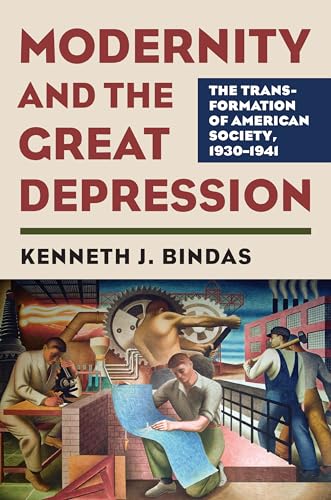Modernity and the Great Depression: The Transformation of American Society, 1930-1941 (CultureAmerica) - Hardcover

Inhaltsangabe
Choice Outstanding Academic Title
Order, planning, and reason--in the depths of the Great Depression, with the nation teetering on the brink of collapse, this was what was needed. And this, Kenneth J. Bindas suggests, was what the ideas and ideals of modernity offered--a way to make sense of the chaos all around. In Modernity and the Great Depression, Bindas offers a new perspective on the provenance and power of modernist thought and practice in early twentieth-century America.
In the midst of a terrible economic, social, and political crisis, modernism provided an alternative to the response of many traditional moralists and religious leaders. Promoting a faith based in reason, organization, and planning, modernists espoused a salvation that was not eternal but rather temporal, tangible, and, for a generation with so little to hold onto, eminently practical--one that found virtue in pleasure and private pursuits. After surveying the contested definitional terrain of "modernism" and "modernity," Bindas tracks their course and influence through such government programs as the Civilian Conservation Corps and the National Youth Administration; in the massive American Expositions and World's Fairs that heralded progress and a better future; on the efforts of women interior decorators to update and enhance the comforts of the modern home; and--thanks to the proliferation of electricity and radio--on the popular and high-culture musical recordings and broadcasts that reinforced a shift away from traditional modes of performance and reception.
In the transformation he describes, Bindas also locates the limits of modernism's influence, as later generations confronted the spiritual shortcomings of its ultra-rationalist and materialist paradigm.
Die Inhaltsangabe kann sich auf eine andere Ausgabe dieses Titels beziehen.
Über die Autorin bzw. den Autor
Kenneth J. Bindas is professor of history at Kent State University and author of Remembering the Great Depression in the Rural South; Swing, That Modern Sound: The Cultural Context of Swing Music in America, 1935–1947; and All of This Music Belongs to the Nation: The WPA’s Federal Music Project and American Society, 1935–1939.
„Über diesen Titel“ kann sich auf eine andere Ausgabe dieses Titels beziehen.
Suchergebnisse für Modernity and the Great Depression: The Transformation...
Modernity and the Great Depression
Anbieter: PBShop.store UK, Fairford, GLOS, Vereinigtes Königreich
HRD. Zustand: New. New Book. Shipped from UK. Established seller since 2000. Artikel-Nr. FW-9780700624003
Neu kaufen
Anzahl: 4 verfügbar
Modernity and the Great Depression The Transformation of American Society, 1930 1941
Anbieter: Revaluation Books, Exeter, Vereinigtes Königreich
Hardcover. Zustand: Brand New. 277 pages. 9.25x6.25x1.00 inches. In Stock. Artikel-Nr. x-0700624007
Neu kaufen
Anzahl: 2 verfügbar
Modernity and the Great Depression
Anbieter: moluna, Greven, Deutschland
Gebunden. Zustand: New. Explores how the worst economic, social, and political crisis in the last century created the space for a national conversation about the ideals of modernity order, planning, and reason.Über den Autor Bindas s provocative and. Artikel-Nr. 898499822
Neu kaufen
Anzahl: 4 verfügbar
Modernity and the Great Depression : The Transformation of American Society, 1930-1941
Anbieter: AHA-BUCH GmbH, Einbeck, Deutschland
Buch. Zustand: Neu. Neuware - Choice Outstanding Academic TitleOrder, planning, and reason--in the depths of the Great Depression, with the nation teetering on the brink of collapse, this was what was needed. And this, Kenneth J. Bindas suggests, was what the ideas and ideals of modernity offered--a way to make sense of the chaos all around. In Modernity and the Great Depression, Bindas offers a new perspective on the provenance and power of modernist thought and practice in early twentieth-century America.In the midst of a terrible economic, social, and political crisis, modernism provided an alternative to the response of many traditional moralists and religious leaders. Promoting a faith based in reason, organization, and planning, modernists espoused a salvation that was not eternal but rather temporal, tangible, and, for a generation with so little to hold onto, eminently practical--one that found virtue in pleasure and private pursuits. After surveying the contested definitional terrain of 'modernism' and 'modernity,' Bindas tracks their course and influence through such government programs as the Civilian Conservation Corps and the National Youth Administration; in the massive American Expositions and World's Fairs that heralded progress and a better future; on the efforts of women interior decorators to update and enhance the comforts of the modern home; and--thanks to the proliferation of electricity and radio--on the popular and high-culture musical recordings and broadcasts that reinforced a shift away from traditional modes of performance and reception.In the transformation he describes, Bindas also locates the limits of modernism's influence, as later generations confronted the spiritual shortcomings of its ultra-rationalist and materialist paradigm. Artikel-Nr. 9780700624003
Neu kaufen
Anzahl: 1 verfügbar
